Business Law Assignment - LST2LBA: Contractual Agreements Analysis
VerifiedAdded on 2022/08/26
|9
|2158
|23
Report
AI Summary
This report analyzes two business law scenarios. The first scenario involves a contract between John and Motorbikes Private Ltd, examining the validity and enforceability of the contract under the Corporations Act of 2001, particularly sections 124, 126, 127, and 198, and referencing the case of Solomon v Solomon. The report concludes the contract is enforceable. The second scenario concerns a contract between Cakes Private Ltd and George. It assesses the contract's enforceability, focusing on Section 127 of the Corporations Act, and determines if George can withdraw. The report references Paley Properties Private Ltd v Knight Frank Australia Private Ltd. The report concludes the contract is not enforceable.
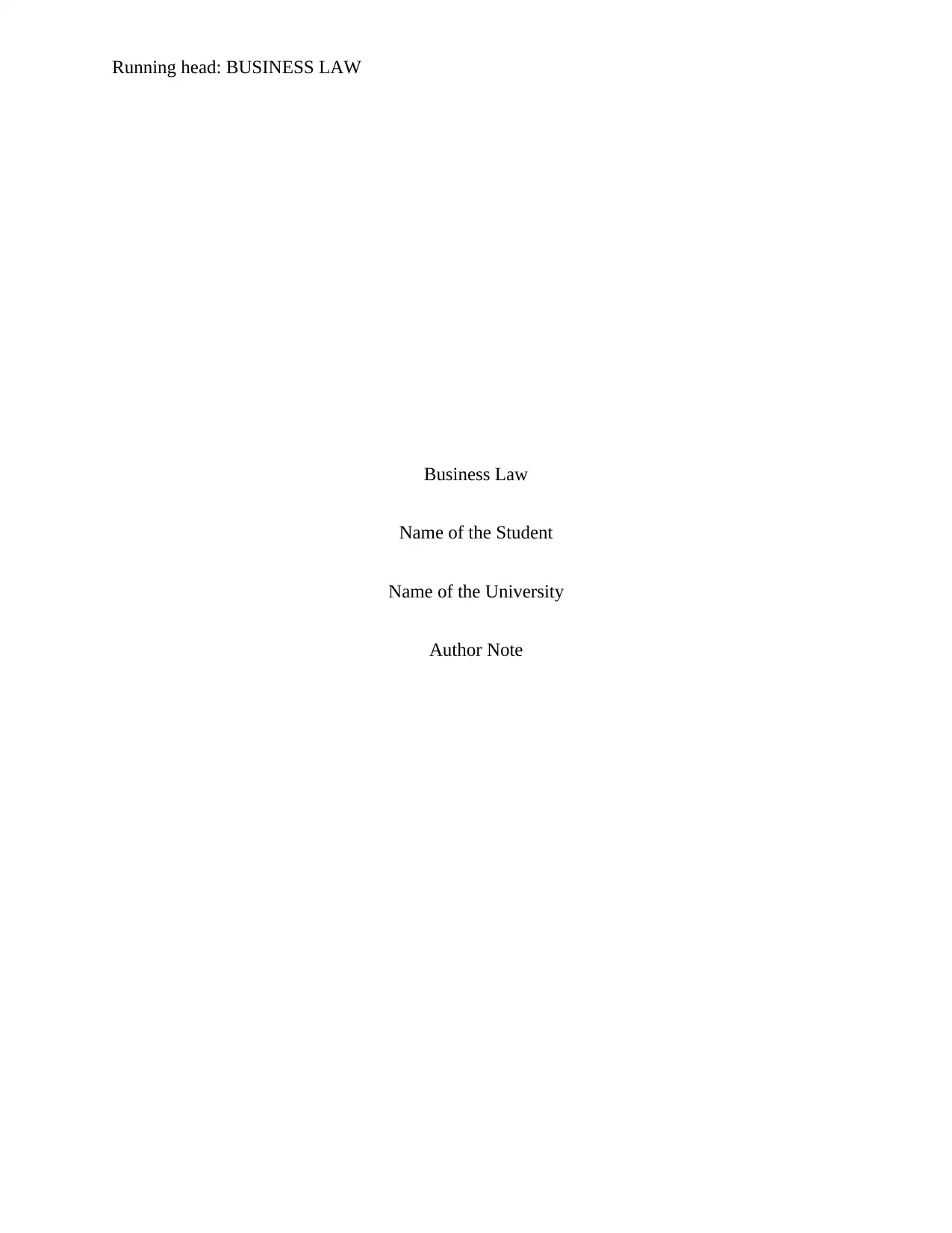
Running head: BUSINESS LAW
Business Law
Name of the Student
Name of the University
Author Note
Business Law
Name of the Student
Name of the University
Author Note
Paraphrase This Document
Need a fresh take? Get an instant paraphrase of this document with our AI Paraphraser
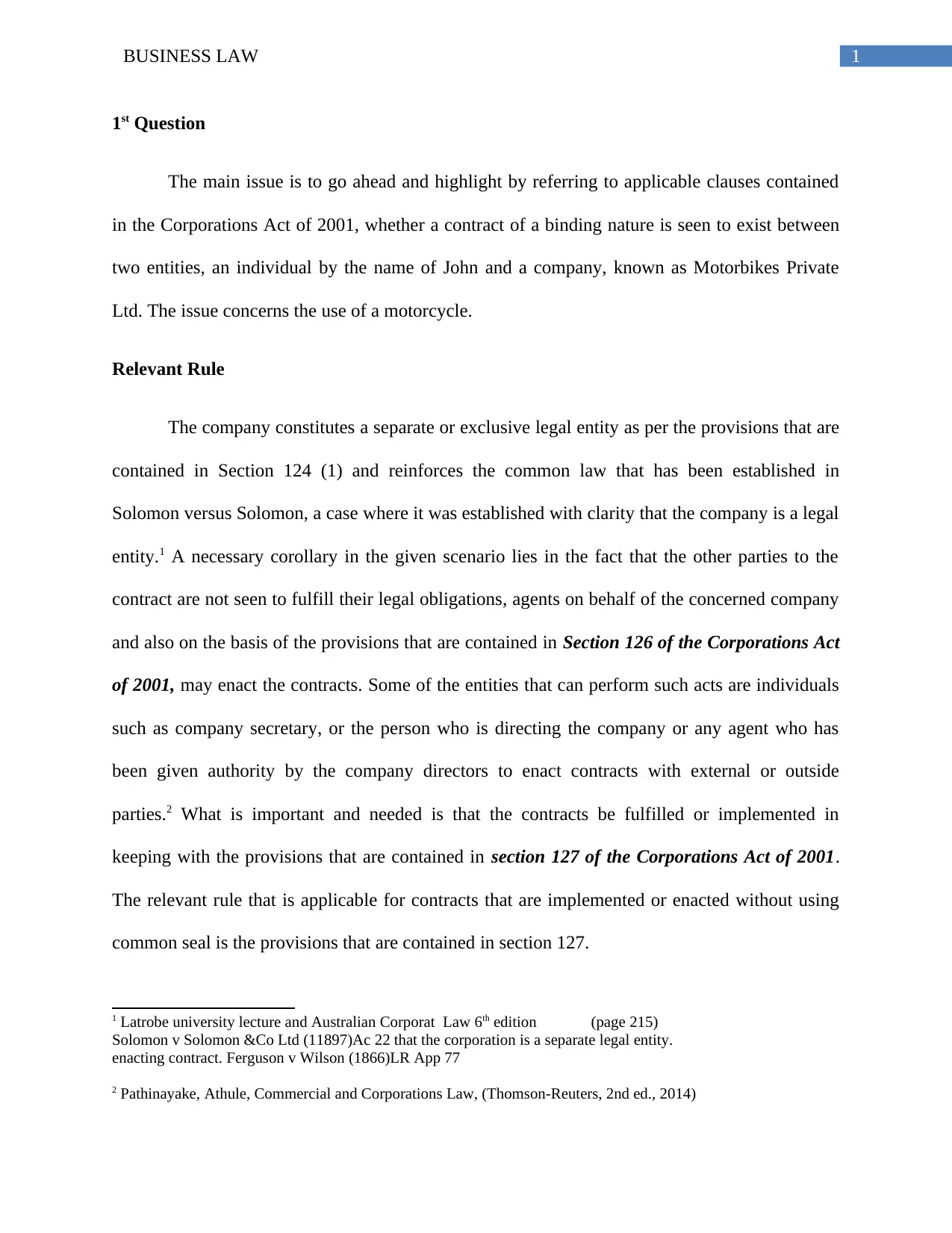
1BUSINESS LAW
1st Question
The main issue is to go ahead and highlight by referring to applicable clauses contained
in the Corporations Act of 2001, whether a contract of a binding nature is seen to exist between
two entities, an individual by the name of John and a company, known as Motorbikes Private
Ltd. The issue concerns the use of a motorcycle.
Relevant Rule
The company constitutes a separate or exclusive legal entity as per the provisions that are
contained in Section 124 (1) and reinforces the common law that has been established in
Solomon versus Solomon, a case where it was established with clarity that the company is a legal
entity.1 A necessary corollary in the given scenario lies in the fact that the other parties to the
contract are not seen to fulfill their legal obligations, agents on behalf of the concerned company
and also on the basis of the provisions that are contained in Section 126 of the Corporations Act
of 2001, may enact the contracts. Some of the entities that can perform such acts are individuals
such as company secretary, or the person who is directing the company or any agent who has
been given authority by the company directors to enact contracts with external or outside
parties.2 What is important and needed is that the contracts be fulfilled or implemented in
keeping with the provisions that are contained in section 127 of the Corporations Act of 2001.
The relevant rule that is applicable for contracts that are implemented or enacted without using
common seal is the provisions that are contained in section 127.
1 Latrobe university lecture and Australian Corporat Law 6th edition (page 215)
Solomon v Solomon &Co Ltd (11897)Ac 22 that the corporation is a separate legal entity.
enacting contract. Ferguson v Wilson (1866)LR App 77
2 Pathinayake, Athule, Commercial and Corporations Law, (Thomson-Reuters, 2nd ed., 2014)
1st Question
The main issue is to go ahead and highlight by referring to applicable clauses contained
in the Corporations Act of 2001, whether a contract of a binding nature is seen to exist between
two entities, an individual by the name of John and a company, known as Motorbikes Private
Ltd. The issue concerns the use of a motorcycle.
Relevant Rule
The company constitutes a separate or exclusive legal entity as per the provisions that are
contained in Section 124 (1) and reinforces the common law that has been established in
Solomon versus Solomon, a case where it was established with clarity that the company is a legal
entity.1 A necessary corollary in the given scenario lies in the fact that the other parties to the
contract are not seen to fulfill their legal obligations, agents on behalf of the concerned company
and also on the basis of the provisions that are contained in Section 126 of the Corporations Act
of 2001, may enact the contracts. Some of the entities that can perform such acts are individuals
such as company secretary, or the person who is directing the company or any agent who has
been given authority by the company directors to enact contracts with external or outside
parties.2 What is important and needed is that the contracts be fulfilled or implemented in
keeping with the provisions that are contained in section 127 of the Corporations Act of 2001.
The relevant rule that is applicable for contracts that are implemented or enacted without using
common seal is the provisions that are contained in section 127.
1 Latrobe university lecture and Australian Corporat Law 6th edition (page 215)
Solomon v Solomon &Co Ltd (11897)Ac 22 that the corporation is a separate legal entity.
enacting contract. Ferguson v Wilson (1866)LR App 77
2 Pathinayake, Athule, Commercial and Corporations Law, (Thomson-Reuters, 2nd ed., 2014)
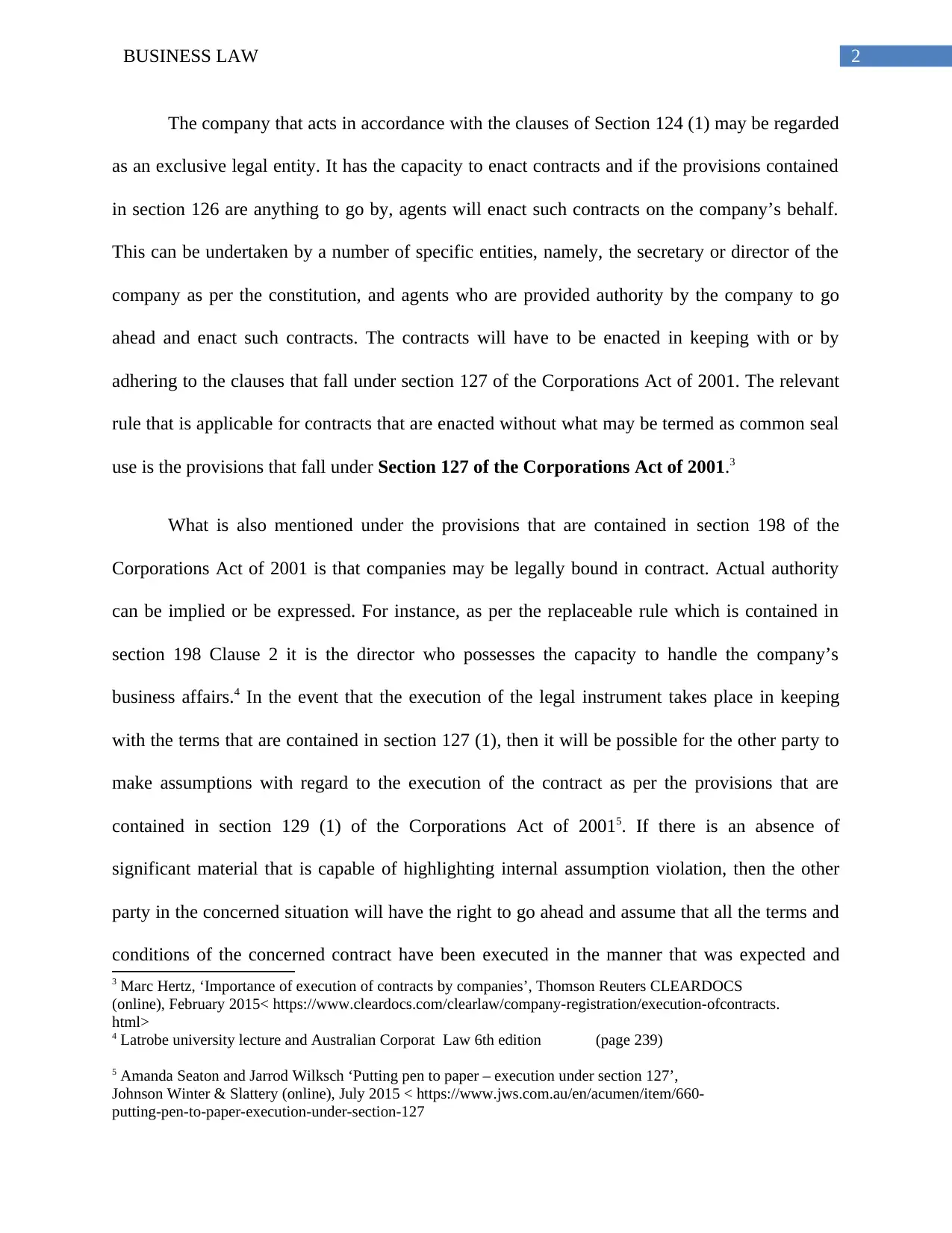
2BUSINESS LAW
The company that acts in accordance with the clauses of Section 124 (1) may be regarded
as an exclusive legal entity. It has the capacity to enact contracts and if the provisions contained
in section 126 are anything to go by, agents will enact such contracts on the company’s behalf.
This can be undertaken by a number of specific entities, namely, the secretary or director of the
company as per the constitution, and agents who are provided authority by the company to go
ahead and enact such contracts. The contracts will have to be enacted in keeping with or by
adhering to the clauses that fall under section 127 of the Corporations Act of 2001. The relevant
rule that is applicable for contracts that are enacted without what may be termed as common seal
use is the provisions that fall under Section 127 of the Corporations Act of 2001.3
What is also mentioned under the provisions that are contained in section 198 of the
Corporations Act of 2001 is that companies may be legally bound in contract. Actual authority
can be implied or be expressed. For instance, as per the replaceable rule which is contained in
section 198 Clause 2 it is the director who possesses the capacity to handle the company’s
business affairs.4 In the event that the execution of the legal instrument takes place in keeping
with the terms that are contained in section 127 (1), then it will be possible for the other party to
make assumptions with regard to the execution of the contract as per the provisions that are
contained in section 129 (1) of the Corporations Act of 20015. If there is an absence of
significant material that is capable of highlighting internal assumption violation, then the other
party in the concerned situation will have the right to go ahead and assume that all the terms and
conditions of the concerned contract have been executed in the manner that was expected and
3 Marc Hertz, ‘Importance of execution of contracts by companies’, Thomson Reuters CLEARDOCS
(online), February 2015< https://www.cleardocs.com/clearlaw/company-registration/execution-ofcontracts.
html>
4 Latrobe university lecture and Australian Corporat Law 6th edition (page 239)
5 Amanda Seaton and Jarrod Wilksch ‘Putting pen to paper – execution under section 127’,
Johnson Winter & Slattery (online), July 2015 < https://www.jws.com.au/en/acumen/item/660-
putting-pen-to-paper-execution-under-section-127
The company that acts in accordance with the clauses of Section 124 (1) may be regarded
as an exclusive legal entity. It has the capacity to enact contracts and if the provisions contained
in section 126 are anything to go by, agents will enact such contracts on the company’s behalf.
This can be undertaken by a number of specific entities, namely, the secretary or director of the
company as per the constitution, and agents who are provided authority by the company to go
ahead and enact such contracts. The contracts will have to be enacted in keeping with or by
adhering to the clauses that fall under section 127 of the Corporations Act of 2001. The relevant
rule that is applicable for contracts that are enacted without what may be termed as common seal
use is the provisions that fall under Section 127 of the Corporations Act of 2001.3
What is also mentioned under the provisions that are contained in section 198 of the
Corporations Act of 2001 is that companies may be legally bound in contract. Actual authority
can be implied or be expressed. For instance, as per the replaceable rule which is contained in
section 198 Clause 2 it is the director who possesses the capacity to handle the company’s
business affairs.4 In the event that the execution of the legal instrument takes place in keeping
with the terms that are contained in section 127 (1), then it will be possible for the other party to
make assumptions with regard to the execution of the contract as per the provisions that are
contained in section 129 (1) of the Corporations Act of 20015. If there is an absence of
significant material that is capable of highlighting internal assumption violation, then the other
party in the concerned situation will have the right to go ahead and assume that all the terms and
conditions of the concerned contract have been executed in the manner that was expected and
3 Marc Hertz, ‘Importance of execution of contracts by companies’, Thomson Reuters CLEARDOCS
(online), February 2015< https://www.cleardocs.com/clearlaw/company-registration/execution-ofcontracts.
html>
4 Latrobe university lecture and Australian Corporat Law 6th edition (page 239)
5 Amanda Seaton and Jarrod Wilksch ‘Putting pen to paper – execution under section 127’,
Johnson Winter & Slattery (online), July 2015 < https://www.jws.com.au/en/acumen/item/660-
putting-pen-to-paper-execution-under-section-127
⊘ This is a preview!⊘
Do you want full access?
Subscribe today to unlock all pages.

Trusted by 1+ million students worldwide
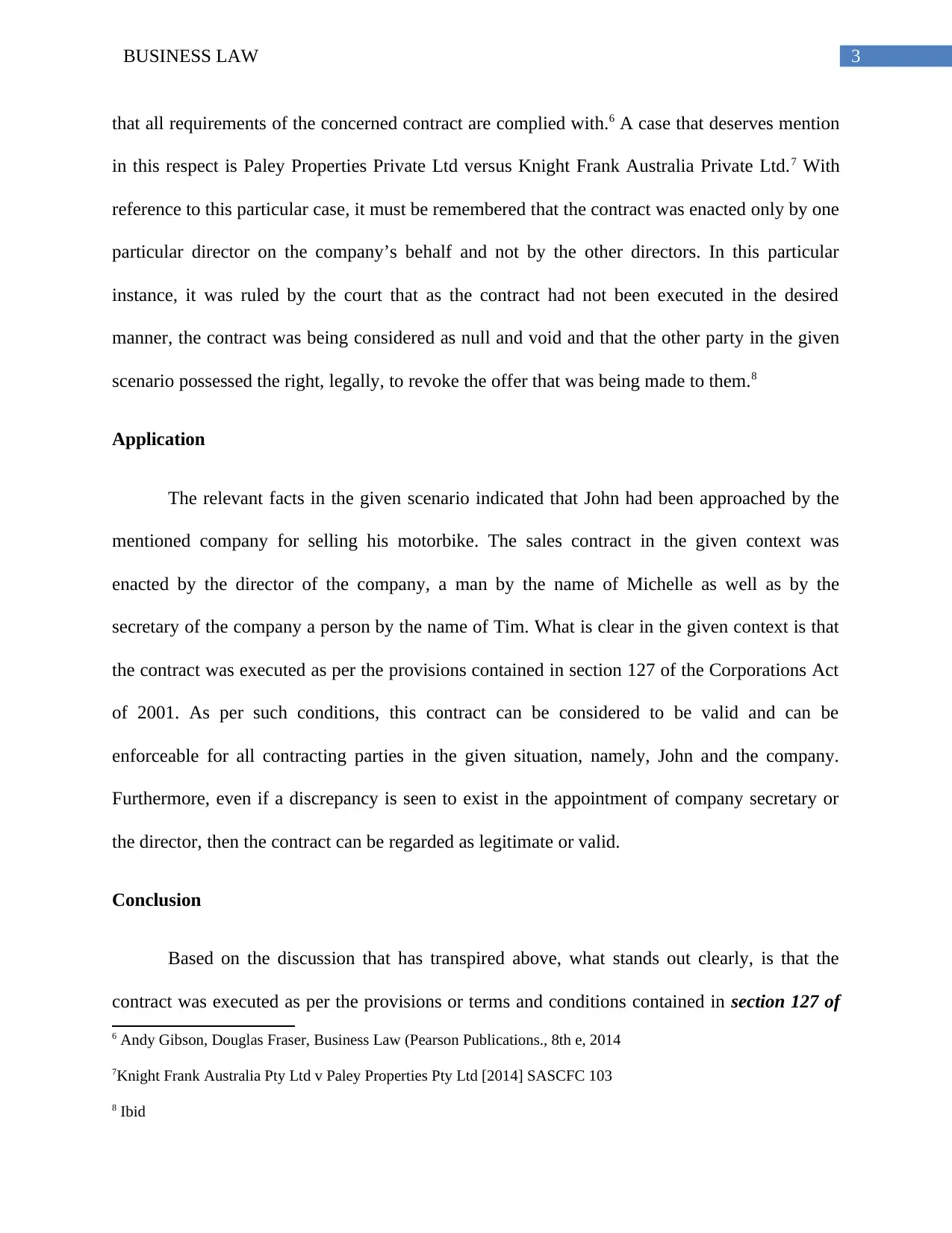
3BUSINESS LAW
that all requirements of the concerned contract are complied with.6 A case that deserves mention
in this respect is Paley Properties Private Ltd versus Knight Frank Australia Private Ltd.7 With
reference to this particular case, it must be remembered that the contract was enacted only by one
particular director on the company’s behalf and not by the other directors. In this particular
instance, it was ruled by the court that as the contract had not been executed in the desired
manner, the contract was being considered as null and void and that the other party in the given
scenario possessed the right, legally, to revoke the offer that was being made to them.8
Application
The relevant facts in the given scenario indicated that John had been approached by the
mentioned company for selling his motorbike. The sales contract in the given context was
enacted by the director of the company, a man by the name of Michelle as well as by the
secretary of the company a person by the name of Tim. What is clear in the given context is that
the contract was executed as per the provisions contained in section 127 of the Corporations Act
of 2001. As per such conditions, this contract can be considered to be valid and can be
enforceable for all contracting parties in the given situation, namely, John and the company.
Furthermore, even if a discrepancy is seen to exist in the appointment of company secretary or
the director, then the contract can be regarded as legitimate or valid.
Conclusion
Based on the discussion that has transpired above, what stands out clearly, is that the
contract was executed as per the provisions or terms and conditions contained in section 127 of
6 Andy Gibson, Douglas Fraser, Business Law (Pearson Publications., 8th e, 2014
7Knight Frank Australia Pty Ltd v Paley Properties Pty Ltd [2014] SASCFC 103
8 Ibid
that all requirements of the concerned contract are complied with.6 A case that deserves mention
in this respect is Paley Properties Private Ltd versus Knight Frank Australia Private Ltd.7 With
reference to this particular case, it must be remembered that the contract was enacted only by one
particular director on the company’s behalf and not by the other directors. In this particular
instance, it was ruled by the court that as the contract had not been executed in the desired
manner, the contract was being considered as null and void and that the other party in the given
scenario possessed the right, legally, to revoke the offer that was being made to them.8
Application
The relevant facts in the given scenario indicated that John had been approached by the
mentioned company for selling his motorbike. The sales contract in the given context was
enacted by the director of the company, a man by the name of Michelle as well as by the
secretary of the company a person by the name of Tim. What is clear in the given context is that
the contract was executed as per the provisions contained in section 127 of the Corporations Act
of 2001. As per such conditions, this contract can be considered to be valid and can be
enforceable for all contracting parties in the given situation, namely, John and the company.
Furthermore, even if a discrepancy is seen to exist in the appointment of company secretary or
the director, then the contract can be regarded as legitimate or valid.
Conclusion
Based on the discussion that has transpired above, what stands out clearly, is that the
contract was executed as per the provisions or terms and conditions contained in section 127 of
6 Andy Gibson, Douglas Fraser, Business Law (Pearson Publications., 8th e, 2014
7Knight Frank Australia Pty Ltd v Paley Properties Pty Ltd [2014] SASCFC 103
8 Ibid
Paraphrase This Document
Need a fresh take? Get an instant paraphrase of this document with our AI Paraphraser
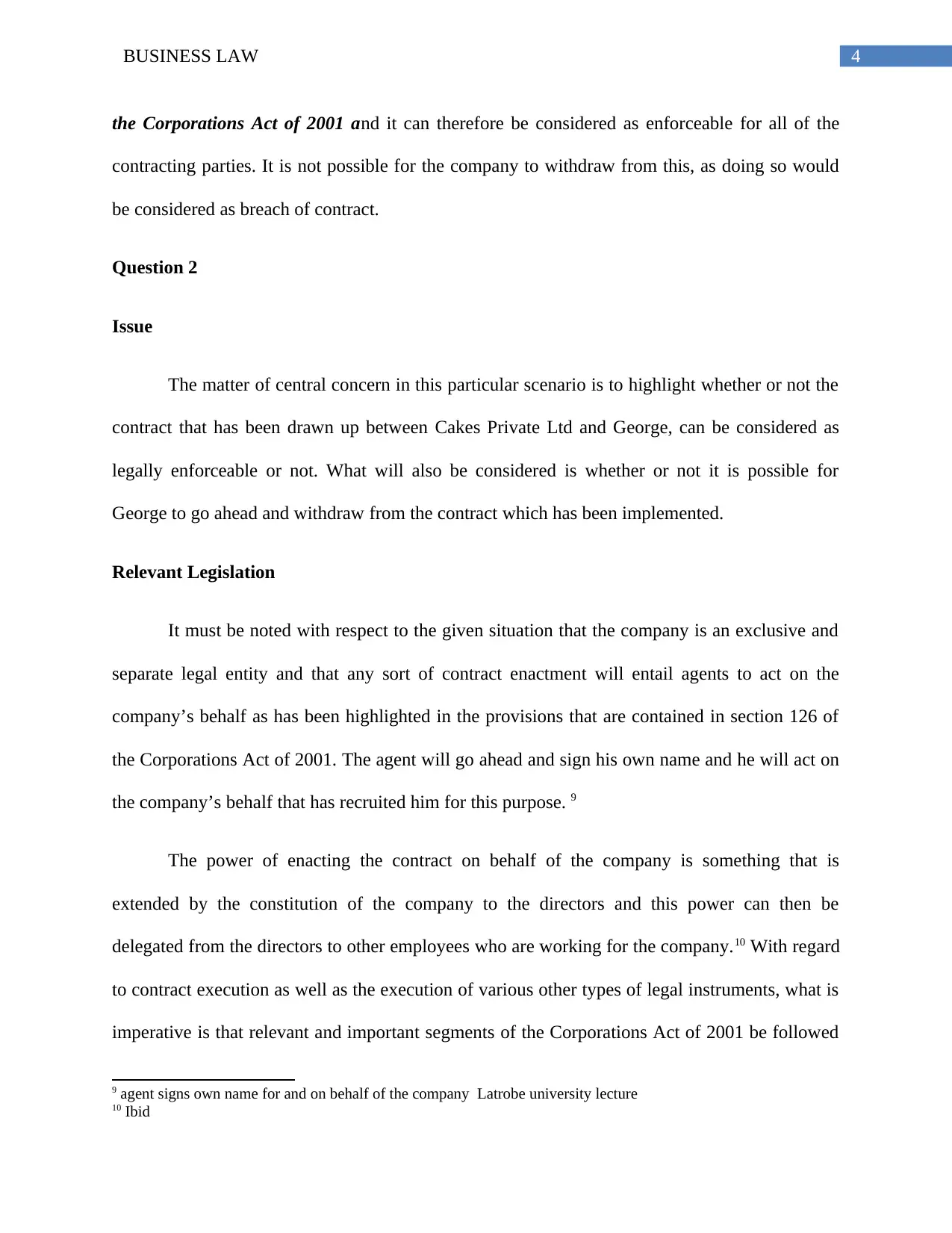
4BUSINESS LAW
the Corporations Act of 2001 and it can therefore be considered as enforceable for all of the
contracting parties. It is not possible for the company to withdraw from this, as doing so would
be considered as breach of contract.
Question 2
Issue
The matter of central concern in this particular scenario is to highlight whether or not the
contract that has been drawn up between Cakes Private Ltd and George, can be considered as
legally enforceable or not. What will also be considered is whether or not it is possible for
George to go ahead and withdraw from the contract which has been implemented.
Relevant Legislation
It must be noted with respect to the given situation that the company is an exclusive and
separate legal entity and that any sort of contract enactment will entail agents to act on the
company’s behalf as has been highlighted in the provisions that are contained in section 126 of
the Corporations Act of 2001. The agent will go ahead and sign his own name and he will act on
the company’s behalf that has recruited him for this purpose. 9
The power of enacting the contract on behalf of the company is something that is
extended by the constitution of the company to the directors and this power can then be
delegated from the directors to other employees who are working for the company.10 With regard
to contract execution as well as the execution of various other types of legal instruments, what is
imperative is that relevant and important segments of the Corporations Act of 2001 be followed
9 agent signs own name for and on behalf of the company Latrobe university lecture
10 Ibid
the Corporations Act of 2001 and it can therefore be considered as enforceable for all of the
contracting parties. It is not possible for the company to withdraw from this, as doing so would
be considered as breach of contract.
Question 2
Issue
The matter of central concern in this particular scenario is to highlight whether or not the
contract that has been drawn up between Cakes Private Ltd and George, can be considered as
legally enforceable or not. What will also be considered is whether or not it is possible for
George to go ahead and withdraw from the contract which has been implemented.
Relevant Legislation
It must be noted with respect to the given situation that the company is an exclusive and
separate legal entity and that any sort of contract enactment will entail agents to act on the
company’s behalf as has been highlighted in the provisions that are contained in section 126 of
the Corporations Act of 2001. The agent will go ahead and sign his own name and he will act on
the company’s behalf that has recruited him for this purpose. 9
The power of enacting the contract on behalf of the company is something that is
extended by the constitution of the company to the directors and this power can then be
delegated from the directors to other employees who are working for the company.10 With regard
to contract execution as well as the execution of various other types of legal instruments, what is
imperative is that relevant and important segments of the Corporations Act of 2001 be followed
9 agent signs own name for and on behalf of the company Latrobe university lecture
10 Ibid
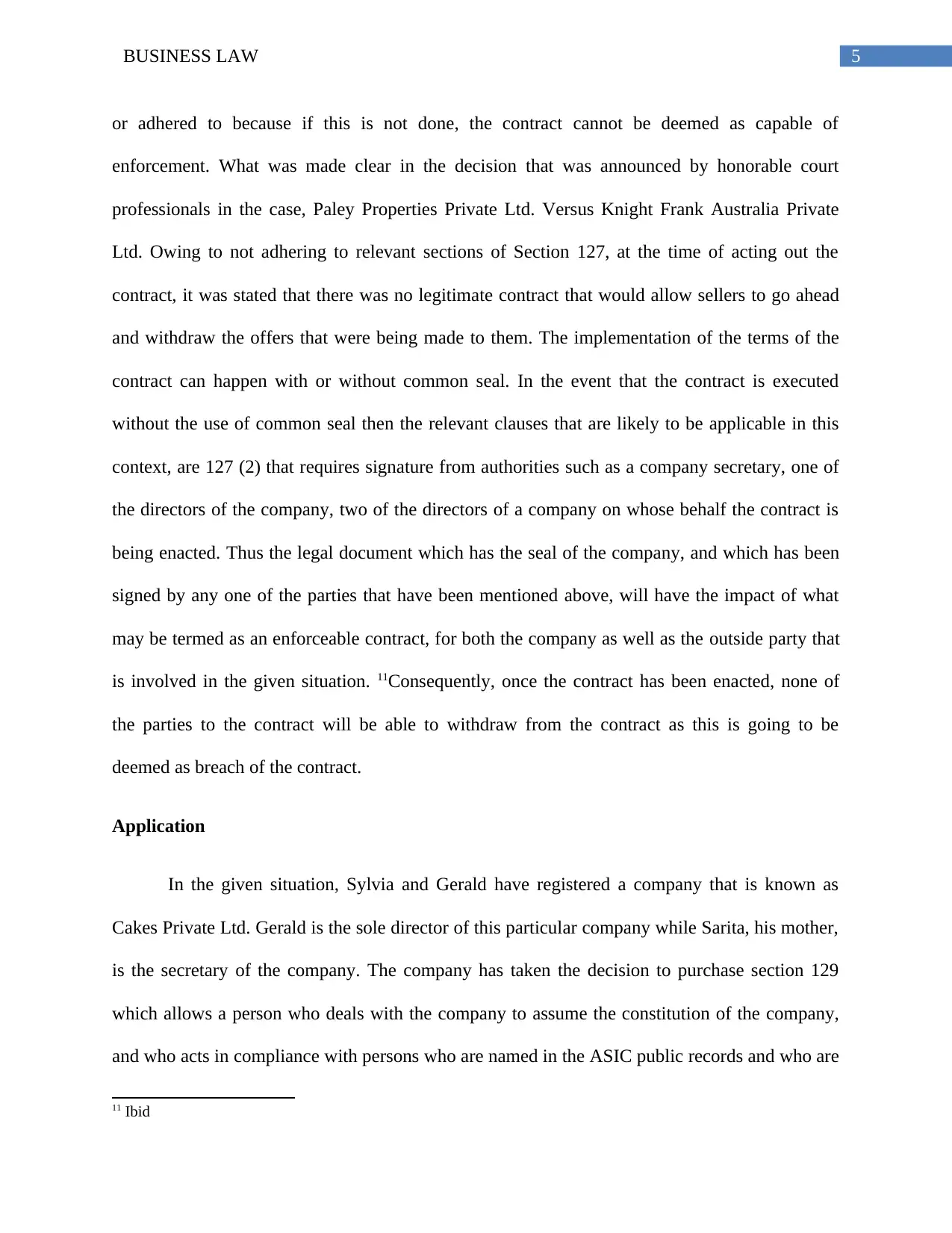
5BUSINESS LAW
or adhered to because if this is not done, the contract cannot be deemed as capable of
enforcement. What was made clear in the decision that was announced by honorable court
professionals in the case, Paley Properties Private Ltd. Versus Knight Frank Australia Private
Ltd. Owing to not adhering to relevant sections of Section 127, at the time of acting out the
contract, it was stated that there was no legitimate contract that would allow sellers to go ahead
and withdraw the offers that were being made to them. The implementation of the terms of the
contract can happen with or without common seal. In the event that the contract is executed
without the use of common seal then the relevant clauses that are likely to be applicable in this
context, are 127 (2) that requires signature from authorities such as a company secretary, one of
the directors of the company, two of the directors of a company on whose behalf the contract is
being enacted. Thus the legal document which has the seal of the company, and which has been
signed by any one of the parties that have been mentioned above, will have the impact of what
may be termed as an enforceable contract, for both the company as well as the outside party that
is involved in the given situation. 11Consequently, once the contract has been enacted, none of
the parties to the contract will be able to withdraw from the contract as this is going to be
deemed as breach of the contract.
Application
In the given situation, Sylvia and Gerald have registered a company that is known as
Cakes Private Ltd. Gerald is the sole director of this particular company while Sarita, his mother,
is the secretary of the company. The company has taken the decision to purchase section 129
which allows a person who deals with the company to assume the constitution of the company,
and who acts in compliance with persons who are named in the ASIC public records and who are
11 Ibid
or adhered to because if this is not done, the contract cannot be deemed as capable of
enforcement. What was made clear in the decision that was announced by honorable court
professionals in the case, Paley Properties Private Ltd. Versus Knight Frank Australia Private
Ltd. Owing to not adhering to relevant sections of Section 127, at the time of acting out the
contract, it was stated that there was no legitimate contract that would allow sellers to go ahead
and withdraw the offers that were being made to them. The implementation of the terms of the
contract can happen with or without common seal. In the event that the contract is executed
without the use of common seal then the relevant clauses that are likely to be applicable in this
context, are 127 (2) that requires signature from authorities such as a company secretary, one of
the directors of the company, two of the directors of a company on whose behalf the contract is
being enacted. Thus the legal document which has the seal of the company, and which has been
signed by any one of the parties that have been mentioned above, will have the impact of what
may be termed as an enforceable contract, for both the company as well as the outside party that
is involved in the given situation. 11Consequently, once the contract has been enacted, none of
the parties to the contract will be able to withdraw from the contract as this is going to be
deemed as breach of the contract.
Application
In the given situation, Sylvia and Gerald have registered a company that is known as
Cakes Private Ltd. Gerald is the sole director of this particular company while Sarita, his mother,
is the secretary of the company. The company has taken the decision to purchase section 129
which allows a person who deals with the company to assume the constitution of the company,
and who acts in compliance with persons who are named in the ASIC public records and who are
11 Ibid
⊘ This is a preview!⊘
Do you want full access?
Subscribe today to unlock all pages.

Trusted by 1+ million students worldwide
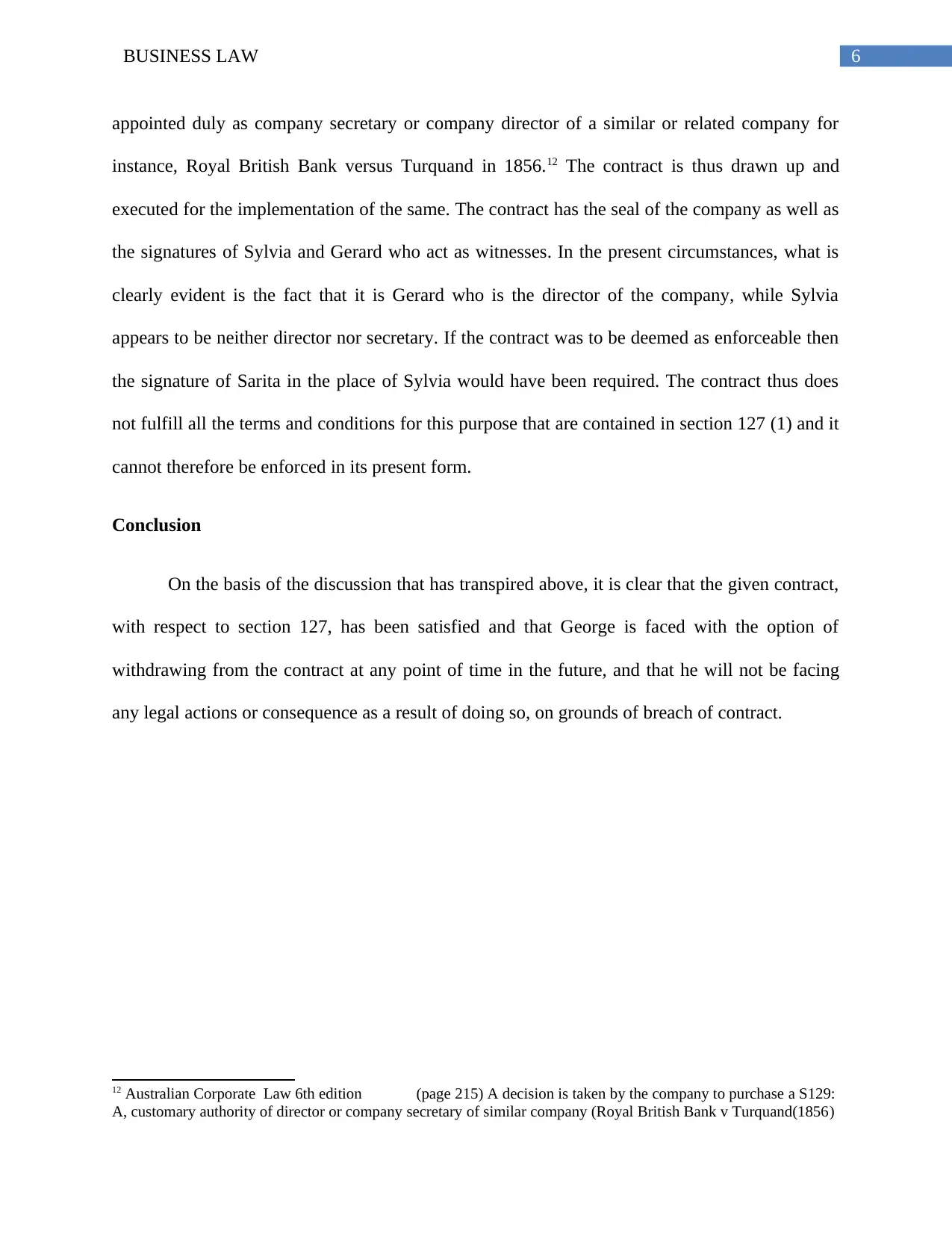
6BUSINESS LAW
appointed duly as company secretary or company director of a similar or related company for
instance, Royal British Bank versus Turquand in 1856.12 The contract is thus drawn up and
executed for the implementation of the same. The contract has the seal of the company as well as
the signatures of Sylvia and Gerard who act as witnesses. In the present circumstances, what is
clearly evident is the fact that it is Gerard who is the director of the company, while Sylvia
appears to be neither director nor secretary. If the contract was to be deemed as enforceable then
the signature of Sarita in the place of Sylvia would have been required. The contract thus does
not fulfill all the terms and conditions for this purpose that are contained in section 127 (1) and it
cannot therefore be enforced in its present form.
Conclusion
On the basis of the discussion that has transpired above, it is clear that the given contract,
with respect to section 127, has been satisfied and that George is faced with the option of
withdrawing from the contract at any point of time in the future, and that he will not be facing
any legal actions or consequence as a result of doing so, on grounds of breach of contract.
12 Australian Corporate Law 6th edition (page 215) A decision is taken by the company to purchase a S129:
A, customary authority of director or company secretary of similar company (Royal British Bank v Turquand(1856)
appointed duly as company secretary or company director of a similar or related company for
instance, Royal British Bank versus Turquand in 1856.12 The contract is thus drawn up and
executed for the implementation of the same. The contract has the seal of the company as well as
the signatures of Sylvia and Gerard who act as witnesses. In the present circumstances, what is
clearly evident is the fact that it is Gerard who is the director of the company, while Sylvia
appears to be neither director nor secretary. If the contract was to be deemed as enforceable then
the signature of Sarita in the place of Sylvia would have been required. The contract thus does
not fulfill all the terms and conditions for this purpose that are contained in section 127 (1) and it
cannot therefore be enforced in its present form.
Conclusion
On the basis of the discussion that has transpired above, it is clear that the given contract,
with respect to section 127, has been satisfied and that George is faced with the option of
withdrawing from the contract at any point of time in the future, and that he will not be facing
any legal actions or consequence as a result of doing so, on grounds of breach of contract.
12 Australian Corporate Law 6th edition (page 215) A decision is taken by the company to purchase a S129:
A, customary authority of director or company secretary of similar company (Royal British Bank v Turquand(1856)
Paraphrase This Document
Need a fresh take? Get an instant paraphrase of this document with our AI Paraphraser
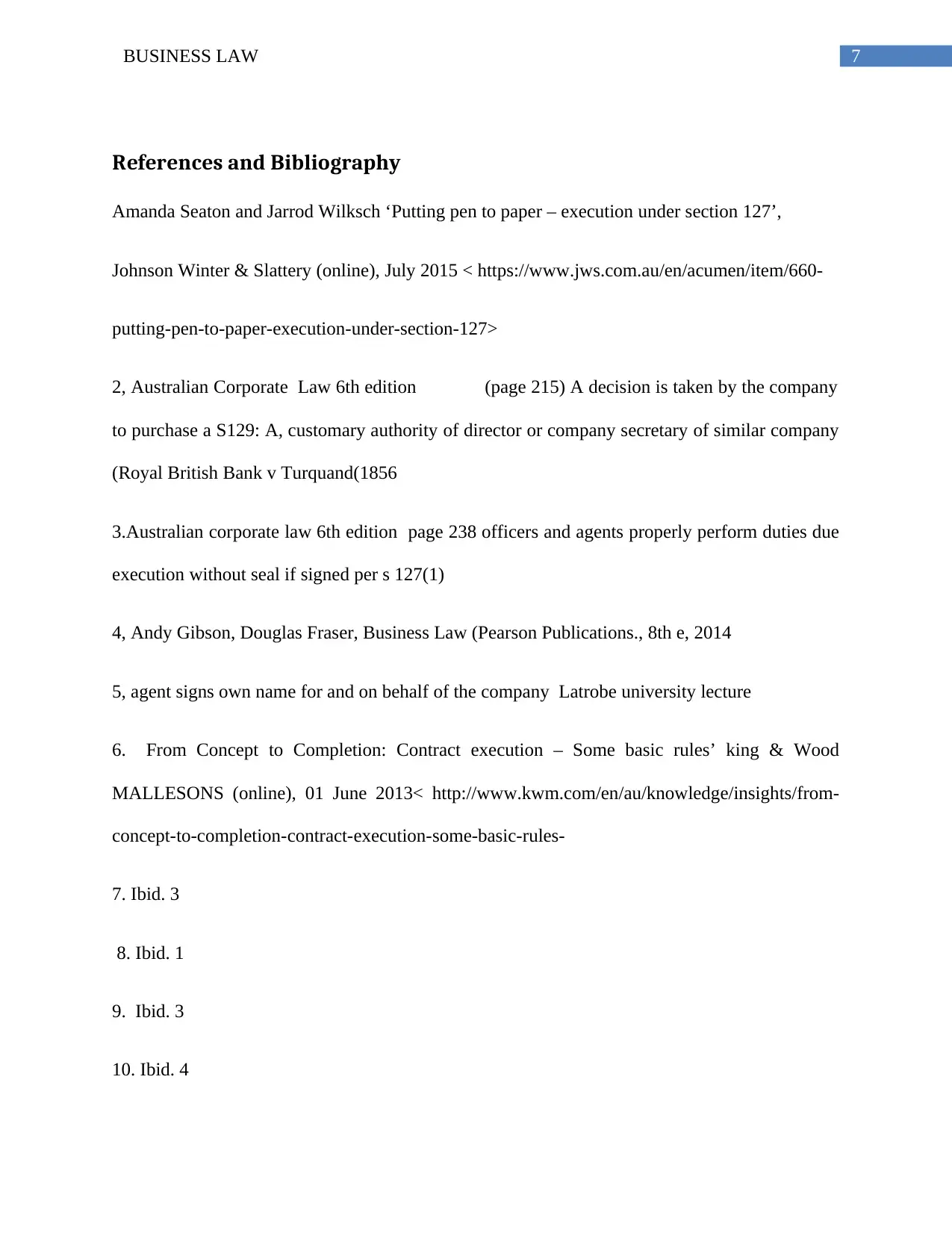
7BUSINESS LAW
References and Bibliography
Amanda Seaton and Jarrod Wilksch ‘Putting pen to paper – execution under section 127’,
Johnson Winter & Slattery (online), July 2015 < https://www.jws.com.au/en/acumen/item/660-
putting-pen-to-paper-execution-under-section-127>
2, Australian Corporate Law 6th edition (page 215) A decision is taken by the company
to purchase a S129: A, customary authority of director or company secretary of similar company
(Royal British Bank v Turquand(1856
3.Australian corporate law 6th edition page 238 officers and agents properly perform duties due
execution without seal if signed per s 127(1)
4, Andy Gibson, Douglas Fraser, Business Law (Pearson Publications., 8th e, 2014
5, agent signs own name for and on behalf of the company Latrobe university lecture
6. From Concept to Completion: Contract execution – Some basic rules’ king & Wood
MALLESONS (online), 01 June 2013< http://www.kwm.com/en/au/knowledge/insights/from-
concept-to-completion-contract-execution-some-basic-rules-
7. Ibid. 3
8. Ibid. 1
9. Ibid. 3
10. Ibid. 4
References and Bibliography
Amanda Seaton and Jarrod Wilksch ‘Putting pen to paper – execution under section 127’,
Johnson Winter & Slattery (online), July 2015 < https://www.jws.com.au/en/acumen/item/660-
putting-pen-to-paper-execution-under-section-127>
2, Australian Corporate Law 6th edition (page 215) A decision is taken by the company
to purchase a S129: A, customary authority of director or company secretary of similar company
(Royal British Bank v Turquand(1856
3.Australian corporate law 6th edition page 238 officers and agents properly perform duties due
execution without seal if signed per s 127(1)
4, Andy Gibson, Douglas Fraser, Business Law (Pearson Publications., 8th e, 2014
5, agent signs own name for and on behalf of the company Latrobe university lecture
6. From Concept to Completion: Contract execution – Some basic rules’ king & Wood
MALLESONS (online), 01 June 2013< http://www.kwm.com/en/au/knowledge/insights/from-
concept-to-completion-contract-execution-some-basic-rules-
7. Ibid. 3
8. Ibid. 1
9. Ibid. 3
10. Ibid. 4
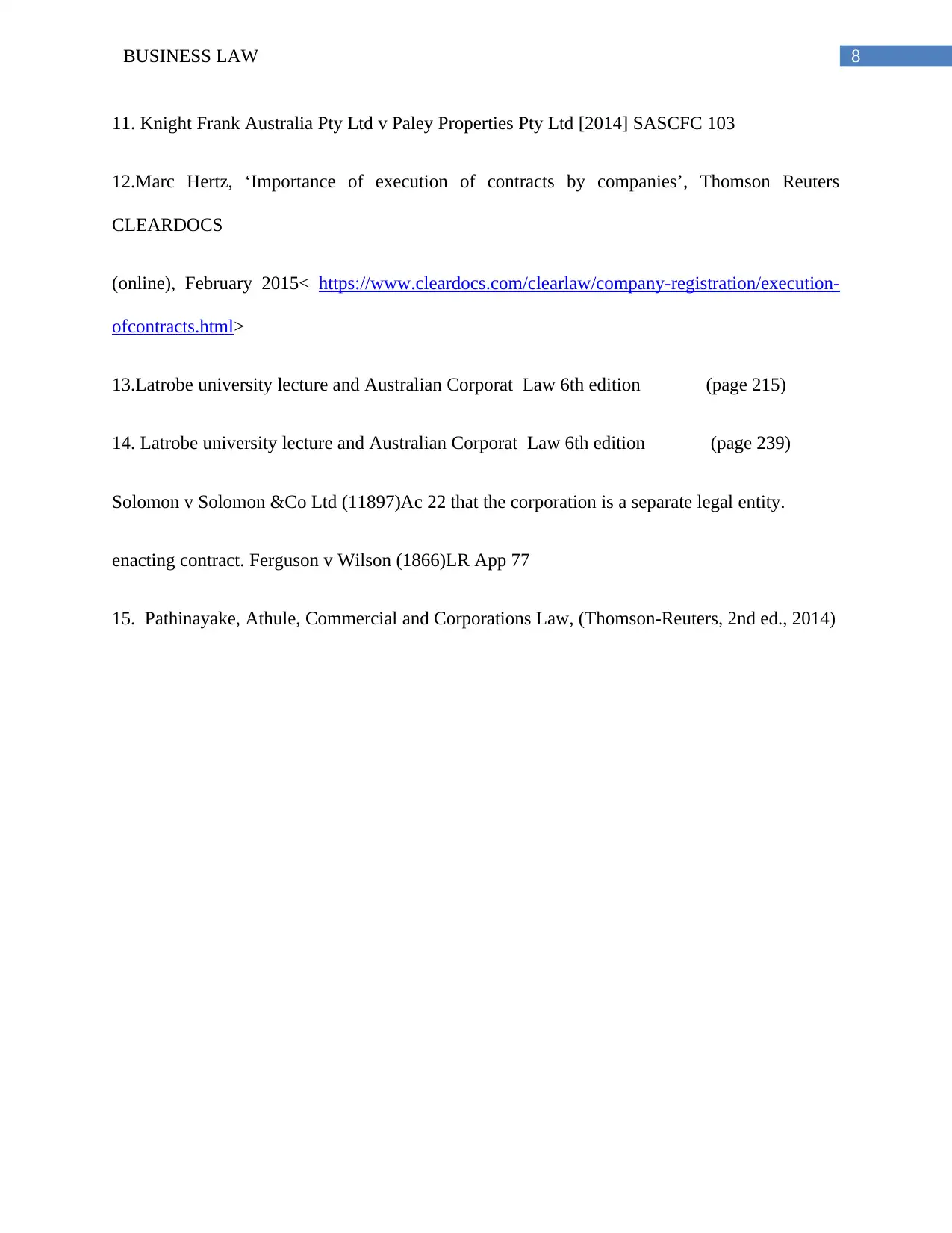
8BUSINESS LAW
11. Knight Frank Australia Pty Ltd v Paley Properties Pty Ltd [2014] SASCFC 103
12.Marc Hertz, ‘Importance of execution of contracts by companies’, Thomson Reuters
CLEARDOCS
(online), February 2015< https://www.cleardocs.com/clearlaw/company-registration/execution-
ofcontracts.html>
13.Latrobe university lecture and Australian Corporat Law 6th edition (page 215)
14. Latrobe university lecture and Australian Corporat Law 6th edition (page 239)
Solomon v Solomon &Co Ltd (11897)Ac 22 that the corporation is a separate legal entity.
enacting contract. Ferguson v Wilson (1866)LR App 77
15. Pathinayake, Athule, Commercial and Corporations Law, (Thomson-Reuters, 2nd ed., 2014)
11. Knight Frank Australia Pty Ltd v Paley Properties Pty Ltd [2014] SASCFC 103
12.Marc Hertz, ‘Importance of execution of contracts by companies’, Thomson Reuters
CLEARDOCS
(online), February 2015< https://www.cleardocs.com/clearlaw/company-registration/execution-
ofcontracts.html>
13.Latrobe university lecture and Australian Corporat Law 6th edition (page 215)
14. Latrobe university lecture and Australian Corporat Law 6th edition (page 239)
Solomon v Solomon &Co Ltd (11897)Ac 22 that the corporation is a separate legal entity.
enacting contract. Ferguson v Wilson (1866)LR App 77
15. Pathinayake, Athule, Commercial and Corporations Law, (Thomson-Reuters, 2nd ed., 2014)
⊘ This is a preview!⊘
Do you want full access?
Subscribe today to unlock all pages.

Trusted by 1+ million students worldwide
1 out of 9
Related Documents
Your All-in-One AI-Powered Toolkit for Academic Success.
+13062052269
info@desklib.com
Available 24*7 on WhatsApp / Email
![[object Object]](/_next/static/media/star-bottom.7253800d.svg)
Unlock your academic potential
Copyright © 2020–2026 A2Z Services. All Rights Reserved. Developed and managed by ZUCOL.





